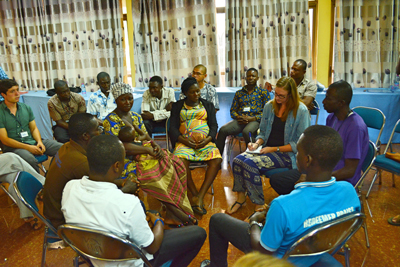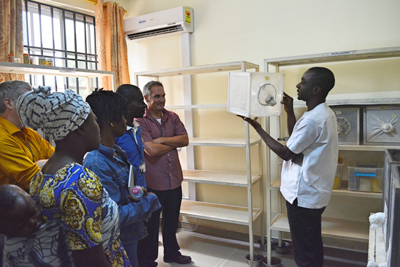
Ghana SWAT’s 2018 STOMP conference emphasized how community engagement, ownership, and action are critical to malaria control and ultimate elimination.
In August 2018, 13 Peace Corps volunteers (PCV) and 14 host-country counterparts gathered in Tamale, Ghana, to learn about malaria biology, epidemiology, vector control, interventions, monitoring and evaluation, and behavior change.
Hosted by Peace Corps Ghana’s Standing with Africa to Terminate (SWAT) Malaria Initiative, in collaboration with the U.S. President’s Malaria Initiative (PMI), the Stomping Out Malaria in Africa (STOMP) conference was the first-ever country-led malaria training.
Over the years, the Peace Corps STOMP program, with PMI support, has trained and sent more than 800 specialized malaria-prevention volunteers to serve in communities across Africa. STOMP’s goals include grassroot work, collaborating with partners, and sharing knowledge. These previous trainings were continent-wide, inviting about 20 PCVs (one or two per country) to participate annually in Senegal.
With new Peace Corps policies discontinuing volunteer international travel for in-service training and thus ending the continent-wide training, Ghana SWAT seized an opportunity to focus on country-specific training.
Participants came from the agriculture, health and education sectors and represented eight of Ghana’s 10 regions. Over the course of four days, they started piecing together the malaria-control puzzle to build workable, costed community malaria assessment and implementation plans that could be initiated upon return to their respective communities.
As strengthening country ownership and action were central to the STOMP conference theme, Ghana SWAT sought inclusion and participation of key government counterparts. The Upper East Region health director, district and local health promotion officers and regional National Health Insurance Scheme staff participated to ensure appropriate perspectives, ownership and sustainability. Presentations on the roles and responsibilities of each sector in Ghana built a foundation of understanding that allowed participants and presenters to engage in-depth discussions.
The conference also included a rare visit to the PMI VectorLink office and insectary, which implements indoor residual spraying (IRS) and monitors insecticide resistance and efficacy.
Other sessions focused on malaria biology and epidemiology, the Ghana Health Service, National Health Insurance Scheme, Ghana’s National Malaria Control Program, behavior change models, assessment methodologies and tools, behavioral barriers, the development of community malaria plans and resource exchange.
“What we would like to do is arm [PCVs and their counterparts] with these tools so that they can go back to their villages and figure out specifically where they need to make an intervention and then what that intervention should be,” said Corinne DiVittorio, grants manager for SWAT Ghana.
Participants delved into challenges with malaria interventions such as bednets, indoor residual spraying, and intermittent preventive treatment during pregnancy. Community engagement, ownership, and action are critical in malaria control and ultimate elimination. Community behaviors—such as sleeping under bednets, accepting IRS, seeking care early for testing and treatment, and medication adherence— influence malaria’s severity.
Ghana SWAT’s 2018 STOMP was a successful example of a high-quality country-led training collaboratively implemented by Peace Corps, PMI, and a host government The PCVs and counterparts left motivated, focused, and eager to make a difference in their communities.
“Ultimately the fight against malaria will be won at the community level. It’s when the communities take responsibility and ownership that malaria is prevented,” Eric Tongren, PMI resident advisor in Ghana, said. “Peace Corps volunteers can promote interventions with community engagement and accurate information about their impact and efficacy.”
PCVs have been important PMI collaborators since 2011. PMI field teams have supported PCVs and their counterparts with small program-assistance grants targeting malaria activities such as prevention trainings, school events, small-scale bednet distributions/hang ups, sporting events and proactive community treatment. PMI has also supported third-year malaria volunteers who engage, motivate, form and manage a cadre of volunteers that, like SWAT, provide grass roots community-based malaria control and prevention.
For more details on the Ghana SWAT’s STOMP Conference, watch this video.

